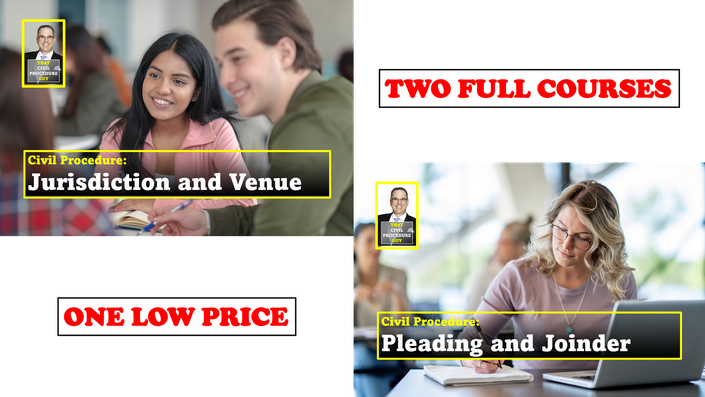
Your instructor
John T. Ritondo, Jr. Esq.
Professor of Law and Practicing Attorney
John T. Ritondo, Jr. is an accomplished attorney, educator, and legal professional based in Birmingham, Alabama. In the last 20 years he has educated a generation of law students as a Professor of Law at the Birmingham School of Law, where he has revolutionized legal education with innovative, case-based curricula in Civil Procedure. His contributions have significantly improved bar exam pass rates and earned him multiple awards, including being name "Outstanding Professor of Law" multiple times.
John’s past career spans notable roles, including serving as a Career Law Clerk for the United States District Court for the Northern District of Alabama, where he contributed to some of the court's highest efficiency and lowest appeal rates. He holds a Juris Doctor from Cumberland School of Law at Samford University and a Bachelor of Arts in Political Science from the University of Alabama.
About the Course
Unlock the foundation of federal civil procedure.
This course offers a comprehensive and practice-oriented deep dive into three of the most fundamental—and frequently tested—doctrines in civil litigation: Subject Matter Jurisdiction, Personal Jurisdiction, and Venue.
Whether you're a law student navigating your first Civil Procedure class, or preparing for the bar exam, this course will equip you with the tools to understand, apply, and confidently navigate the legal rules that determine which court can hear a case, where a case can be brought, and against whom.
In addition to breaking down the constitutional and statutory frameworks for subject matter and personal jurisdiction, this course provides a focused analysis of venue—exploring how federal venue statutes work in tandem with jurisdictional doctrines to ensure a fair and proper forum for litigation.
This course goes beyond the basics to prepare law students for class and exams through a step-by-step exploration of each doctrine. We integrate landmark U.S. Supreme Court decisions, doctrinal analysis, and real-world examples to ensure not just comprehension, but true mastery of federal civil procedure’s foundational principles.

✅ What You’ll Learn:
The difference between federal question and diversity jurisdiction under 28 U.S.C. §§ 1331 & 1332
The rules and limitations of supplemental jurisdiction under § 1367
When and how cases can be removed to federal court (removal & remand under §§ 1441–1447)
The constitutional and statutory foundations of personal jurisdiction
Modern standards for general vs. specific jurisdiction (International Shoe, Daimler, Ford, and more)
The role of long-arm statutes and due process in asserting personal jurisdiction
The statutory framework for venue under 28 U.S.C. § 1391 and related provisions
How venue interacts with jurisdiction to determine the proper forum
When and how venue can be challenged or transferred under §§ 1404 and 1406
🧠 Course Features:
- Clear, concise video lessons with real-world examples
- IRAC-based essay walkthroughs and sample answers
- Multiple-choice quizzes to reinforce learning
- A focus on exam-tested frameworks and practical application
🎯 Who Should Enroll:
- 1L law students taking Civil Procedure
- Bar exam candidates
Curriculum
- What is Personal Jurisdiction? (1:41)
- Personal Jurisdiction in the Federal Court System (2:13)
- Foundations (The Due Process Clause) (1:06)
- The Traditional Bases for Jurisdiction Part 1 (1:46)
- The Traditional Bases for Jurisdiction Part 2 (2:40)
- Long-Arm Statutes (When There's No Traditional Basis for Jurisdiction) (2:45)
- Minimum Contacts Part 1 (The Beginning: International Shoe) (3:31)
- Minimum Contacts Part 2 (Purposeful Availment) (3:15)
- Minimum Contacts Part 3 (Stream of Commerce) (5:11)
- Minimum Contacts Part 4 (When the Plaintiff Has No Contacts With the Forum) (0:44)
- Minimum Contacts Part 5 (Intentional Conduct "Directed" Towards the Forum) (2:19)
- Minimum Contacts Part 6 (Contract "Plus") (0:54)
- Minimum Contacts Part 7 (Personal Jurisdiction by Proxy) (0:45)
- Minimum Contacts Part 8 ("Related" vs. "Related to") (0:39)
- Reasonableness (3:58)
- General Jurisdiction (4:12)
- Special Cases
- Notice: What the Constitution Requires
- Notice: Service of Process
- Introduction to Subject Matter Jurisdiction (0:13)
- The Basics of Subject Matter Jurisdiction (2:47)
- Federal Question Jurisdiction (28 U.S.C. § 1331) (3:43)
- Diversity Jurisdiction (28 U.S.C. § 1332) [PART ONE] -- Diversity of Citizenship (2:14)
- Diversity Jurisdiction (28 U.S.C. § 1332) [PART TWO] -- The Amount in Controversy (2:37)
- Supplemental Jurisdiction (28 U.S.C. § 1367) (3:29)
- Removal Jurisdiction (28 U.S.C. §§ 1441–1455) (0:43)
- Asahi Metal Industry Co. v. Superior Court of California (Detailed Case Study) (2:30)
- Atlantic Marine Construction Co. v. U.S. District Court (Detailed Case Study)
- Bell v. Preferred Life Assurance Society (Detailed Case Study)
- BNSF Railway Co. v. Tyrrell (Detailed Case Study)
- Bristol-Myers Squibb Co. v. Superior Court (Detailed Case Study) (1:46)
- Burger King Corp. v. Rudzewicz (Detailed Case Study) (2:44)
- Burnham v. Superior Court (Detailed Case Study)
- Calder v. Jones (Detailed Case Study) (1:21)
- Carnival Cruise Lines, Inc. v. Shute (Detailed Case Study)
- Daimler AG v. Bauman (Detailed Case Study)
- Dusenbery v. United States (Detailed Case Study)
- Empire HealthChoice Assurance v. McVeigh (Detailed Case Study)
- Ferens v. John Deere Co. (Detailed Case Study)
- Ford Motor Co. v. Montana Eighth Jud. Dist. Ct. (Detailed Case Study)
- Goodyear Dunlop Tires Operations, S.A. v. Brown (Detailed Case Study) (1:30)
- Grable & Sons Metal Products v. Darue Engineering (Detailed Case Study)
- Gulf Oil Corp. v. Gilbert (Detailed Case Study)
- Hanson v. Denckla (Detailed Case Study) (1:54)
- Helicopteros Nacionales de Columbia, S.A. v. Hall (Detailed Case Study)
- Hess v. Pawloski (Detailed Case Study)
- Hoffman v. Blaski (Detailed Case Study)
- International Shoe Co. v. State of Washington (Detailed Case Study) (3:59)
- J. McIntyre Machinery, Ltd. v. Nicastro (Detailed Case Study) (2:21)
- Jones v. Flowers (Detailed Case Study)
- Keeton v. Hustler Magazine, Inc. (Detailed Case Study)
- Louisville & Nashville Railroad Co. v. Mottley (Detailed Case Study) (1:08)
- McGee v. International Life Insurance Co. (Detailed Case Study)
- Mullane v. Central Hanover Bank & Trust Co. (Detailed Case Study)
- Osborn v. Bank of the United States (Detailed Case Study) (1:24)
- Pennoyer v. Neff (Detailed Case Study) (1:25)
- Perkins v. Benquet Consolidated Mining Co. (Detailed Case Study)
- Piper Aircraft v. Reyno (Detailed Case Study)
- Shaffer v. Heitner (Detailed Case Study)
- St. Paul Mercury Indemnity Co. v. Red Cab Co. (Detailed Case Study) (1:26)
- Van Dusen v. Barrack (Detailed Case Study)
- World-Wide Volswagen Corp. v. Woodson (Detailed Case Study) (2:25)



